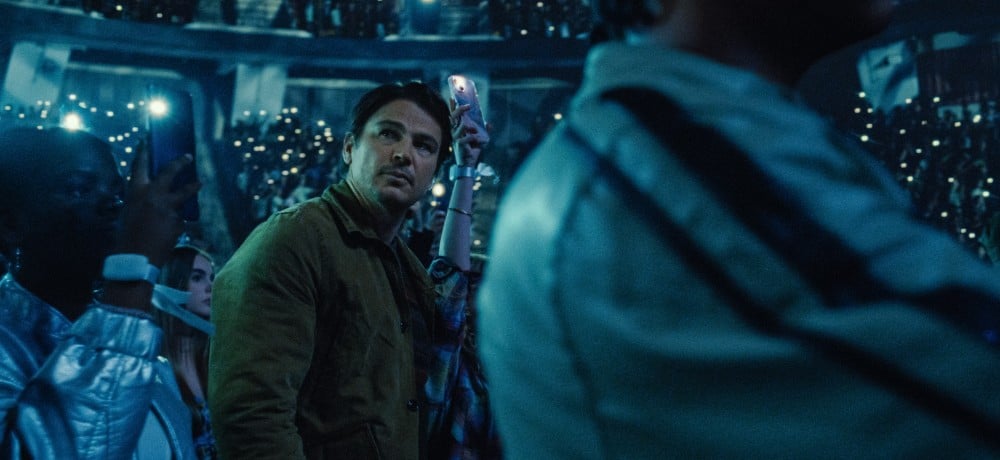






Night Shyamalan's Trap drops the hardest early 2000s-ass theatrical vibes I've seen in a hot minute. It's a Hitchcock x CW lockbox collaboration, except the box is the size of a Philadelphia arena. There's room for Shyamalan's shiftiness to breathe, misdirect, and overindulge — which isn't always a blessing. Trap is a tale of two halves; one the "killer in a stadium" mouse hunt, the other an "outside" procedural as the pursuit intensifies. The problem is, those halves don't play nice. Conceptual ambition transforms into contrived criminal escape antics, turning giddy chuckles into eye-roll sighs — but its divisiveness will be salvation for some.
Josh Hartnett stars as Cooper Adams, a Pennsylvania serial killer who strolls right into an elaborate capture plot. Cooper — the perfect father when not dismembering victims — treats his darling daughter Riley (Ariel Donoghue) to see her favorite musician: Lady Raven (Saleka Shyamalan). The concert, while real, is an elaborate ruse to imprison "The Butcher," which Cooper doesn't realize until he's sitting forty-ish rows away from Lady Raven. Riley's absorbing lifelong memories while Cooper cases the massive Tanaka Arena surrounded by SWAT units — can Cooper prevent "The Butcher" from blowing his cover?
Shyamalan plays "Proud Dad" and molds a twisty-zany thriller around a concert film for Saleka, which works better than expected. In-venue tension is at a premium as Hartnett's charismatic sociopath upholds a facade of fatherly dorkiness. Saleka's vocals don't fray, her stage presence around backup dancers shines bright, and her wardrobe choices shimmer with elegance. Shyamalan's intentions aren't subtle, but they succeed as an innovative twist on containment mysteries that are usually set in cramped quarters. The mixture of Cooper's wolf in suburban everyman clothing, Saleka's stardom, and absurd close-calls with law enforcement sustain the outrageousness of Trap's architecture.
That's when Trap is at its best. Give me B-movie scripting with prestige confidence, like we used to get more of on the silver screen. Shyamalan presents Cooper with an unwinnable scenario that alternatively reads like child's play for the bloodthirsty psychopath, but that's what’s fun. Hartnett devours his role as a murderer who can chameleon through society, exaggerating Cooper's "Father of the Year" behaviors while asserting his "Butcher" confidence through dissociating grins. It's a finger-lickin performance that pairs well with Donoghue's fangirl Riley, as she's entranced by Lady Raven yet aware enough to question her father's anxious tells. Riley hinders Cooper's abilities while exposing his "human" side, an arc that Shyamalan deflates after halftime.
The second portion of Trap, which I'll leave vague, becomes obsessed with analyzing Cooper's motivations and mindset. Everything within the Lady Raven concert is judged softer because it's invigorated and fresh — what follows cranks sputtering gears. An imbalance between halves makes both feel too long based on storytelling intentions, and the third act unravels without the more preposterous environment. Shyamalan starts batty, veers into true crime territory, and keeps shrugging at plot advancements that exist as unexplainables in rationalized situations. Even with Hartnett at the top of his game, Shyamalan loses control with a very signature flavor of not knowing when to stop.
It's frustrating because Shyamalan flashes classic genre techniques in Trap between paranoid split diopter shots and stress-pained extreme closeups. He also sneaks in a few killer jokes, delivered by Kid Cudi's diva "The Thinker" and Jonathan Langdon's unwitting vendor accomplice. On pure entertainment merits, you'll never be bored with Trap. Its issues stem from the differing experiences between Part A and Part B, hammered into a spiraling narrative with diminishing returns.
Trap is a glamorously poppy, out-of-bounds, and unapologetically messy thriller with a tremendous villain performance from Hartnett. Shyamalan channels De Palma to Demme when telling his break-out story from the inside out, but Act III is poisoned by a deluge of head-scratching advancements. There's plenty to appreciate, but as someone who felt the film lagging later into its 115-minute duration, it's an experience that worsens over time. But is Hartnett dominant enough to drag the film across the finish line? He's the only reason I'm swaying positive, so let that be my answer.
Movie Score: 3/5